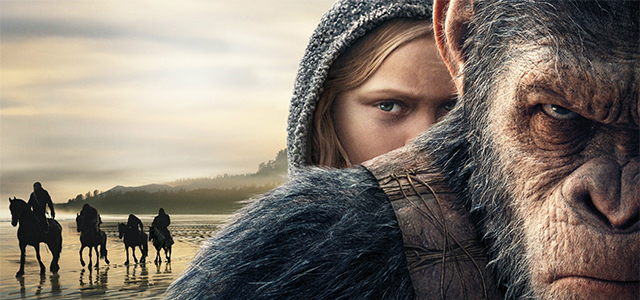Review: War for the Planet of the Apes
(M) Andy Serkis, Woody Harrelson, Steve Zahn, Judy Greer
Who would have thought a film about apes would act as a reminder of what it means to be human? Not only that, but a reminder of the transformative grace of mercy? In the War for the Planet of the Apes the leader of the apes, Caesar, again carries the film and is the epitome of these two themes.
In this fitting trilogy finale, Caesar (Andy Serkis) is older and living with the ramifications of the war with the humans started by a defying ape Koba in the previous film Rise of the Planet of the Apes. A quick refresher for anyone who is unfamiliar with the origin story, a virus has wiped out most of the human race. While trying to find a cure apes were injected with the virus, which actually increased the apes’ intelligence (Oh, the irony). In War human soldiers are ramping up their onslaught as a last stand for humanity led by Woody Harrelson (Now You See Me), who exceeds at portraying the ruthless colonel in the only way Harrelson can. With both humans and apes suffering mass casualties, all Caesar wants is peace and to protect his fellow apes. Before Caesar can lead the apes’ exodus out of the forests that is almost biblical in comparison, he is gripped by grief and promise of revenge. Whether Caesar stands by his doctrine of mercy becomes his biggest test.
The New Zealand digital company, Weta Digital, have outdone themselves with this film. The visual effects and motion capture used for the apes meant that every expression is freakishly distinct and full of life. This is also a testament to the actors, whose realistic and skilful movement did well to portray these primates.
There is something unnerving watching apes speaking, riding horseback and slowly but surely seeing humans perceived superiority slipping away.
What becomes even more jarring is when the apes are more humane than the humans in the film as it’s not just the intellectual but emotional intelligence of the apes that becomes fully realised. Who do we become when humanity is threatened? This is a common dilemma of apocalyptic films when human characters feel that in order to survive, they have to let go of some of the very things that make them human.
In this film, this dilemma sees the lines blurred for the audience on which side you are actually rooting for. If this line of thought is giving you an existential crisis (you’re not alone), there is also comedic flare sprayed at certain points in the film. This is thanks to the introduction of the character Bad Ape that was a welcome break from the dramatic anchoring of the storyline.
The greatest takeaway from the film, however, was the emphasis it had on how mercy and forgiveness is the way to peace and prosperity. Sounds familiar, doesn’t it? That’s because as Christians we know that there is a loving and living God who says there is mercy and forgiveness through Jesus (Matthew 5:7), which is pretty awesome.
For a film that shares this theme of mercy to a wider audience from the challenging questions raised to the emotional ending with the old school scene transitions; all gives off a ‘classic in the making’ vibe. War for the Planet of the Apes certainly makes for a thoughtful action-packed winter blockbuster.
“Go and learn what this means, ‘I desire mercy, and not sacrifice.’ For I came not to call the righteous, but sinners.” – Matthew 9:13
Melissa Stewart





